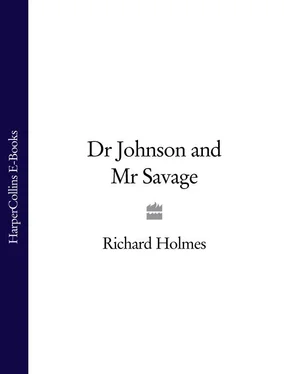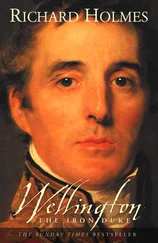Mr Samuel Johnson: poet, playwright and sometime political journalist. News has just reached us in the London mails, of the untimely death of Mr Samuel Johnson, late of the city of Lichfield, at his house at Gough Square, Fleet Street, London, of a sudden Apoplexy.
He was the son of Michael Johnson, bookseller and stationer of Sadler Street and Market Square; and elder brother of Nathanial Johnson, who continued the family business until 1737 in this city. Mr Johnson’s Learning and Eccentricities will be well remembered, which led him to abandon the useful paths of Pedagogy for the ephemeral pursuit of Letters in the capital city, where he found little Success. He was attached in various capacities to the Gentleman’s Magazine of Mr Edward Cave, where he undertook extensive but anonymous Work, most notably the reporting of Parliamentary affairs in the scurrilous rubric of ‘Debates in the Senate of Lilliput’ which he continued for three or four years. He is believed to have published several anonymous Poems and political Pamphlets, of a generally Jacobite tenor and in Opposition to the late Ministry of Mr Walpole.
At the time of his Death, perhaps hastened by Poverty and Overwork, he was engaged in a delusory Scheme to compile by his singular efforts a General Dictionary of the English Language, an enterprise more rationally undertaken in France by a Committee of scholars labouring over many years. The tribulations and disappointments of his Life have been summarised in a recent poetical satire, ‘The Vanity of Human Wishes’, which some may take as his own Elegy.
Samuel Johnson was born in Lichfield on 18th September 1709, and taken by his Mother to London at the age of three years to be touched by her Gracious Majesty Queen Anne for the Evil, a Scrofula infection that marked him in a sad and monstrous Manner for the rest of his life. He was nearly blind in one Eye, and suffered from an unhappy series of nervous Spasms, which rendered him permanently unsuitable for the gracious departments of Society, and nullified many of his efforts to obtain Advancement. To these physiological Causes may be ascribed a melancholy of Temper, and irritable dogmatism of Address, which rendered him at times restless, willful, and barbarous. A brooding spirit of Opposition marked many of his proceedings; he felt the pain of Existence, and perhaps unduly resented the Comforts of Privilege, Fortune, or Power. Of his Learning, there can however be little Doubt.
He achieved Pre-eminence among his peers at the Lichfield Grammar School with remarkable celerity; and in October 1728 proceeded to Pembroke College, Oxford, with a reputation for Scholarship that was little short of prodigious; but after fourteen months was forced to withdraw owing to the Business-failings of his father, who died in 1731 leaving him no Patrimony. A period of lassitude and solitary Study now ensued, alternating with unsuccessful attempts to establish himself as a Schoolmaster at Market Bosworth and at Birmingham.
At last, in what might appear a strange fit of Optimism or of Despair, he married Mrs Elizabeth Jervis Porter, the widow of a Birmingham woollen-draper, the Mother of three children and a Woman over twenty years his senior, on 9 July 1735 at St Werburgh’s church, Derby. This Union is said to have been the cause of great Solace to Johnson, and of great Merriment to his Friends. He invested his Wife’s dowry of some £600 in the venture of a private School at Edial, Lichfield, which failed within two years, leaving him without Resource. He was therefore obliged to seek some other Means of Support, and having no Profession, became, by Necessity, an Author.
Removing precipitously to London in the spring of 1737, Mr Johnson sought Employment among the denizens of Grub Street, while attempting to finish ‘Irene’, a blank-verse Tragedy of the passions, incommodiously located in Constantinople at the time of the Turkish ascendancy. He is said to have been greatly attached to his heroine, Aspasia, who resists the heathen Blandishments of the Sultan Mahomet, confirming thereby her Virtue, her Religion, and eventually the Dictates of her Heart.
The insolence of Power, and the Temptations of the animal Passions, appear to have been a constant theme of Mr Johnson’s meditations at this period of his Life, and may reflect upon his own unhappy Situation. But finding himself now no more successful as a Tragedian, than formerly as a Schoolmaster, he at length established a connection with the Gentleman’s Magazine where he earned his Bread as a low writer of Translations, Reviews, Catalogues and Commentaries over the ensuing decade. Throughout these years he knew great Poverty, and his Union with Mrs Johnson is rumoured to have been at Times interrupted.
The spirit of Discontent, if not of Subversion, is revealed in his Imitation of Juvenal’s Third Satire on Rome, which he published anonymously as ‘London’ in 1738; and his Pamphlets in prose and verse directed against the Ministry. In 1744 he published through Mr Dodsley a remarkable Apologia for the Life of the notorious Mr Richard Savage, the self-styled Volunteer Laureate and claimant to the Rivers title, a man renowned equally for his Poetry and his Profligacy.
Mr Johnson’s familiarity with this Gentleman and his London haunts, at the very Nadir of his misfortunes, may indicate something of his own Circumstances. The Performance is executed with both Tenderness and Rigour, as if the Author was to some degree at War with his own Nature and Outlook in the judgement of his unhappy Friend. The Work, though cast in the ephemeral genre of commercial Biography, has received Praise in many quarters including the Approbation of Mr Henry Fielding (whose History of Tom Jones: A Foundling now lies before the World); and it may be counted among the most Successful and Diverting that Mr Johnson was destined to produce.
Disappointed in his literary Prospects, disheartened in his political Hopes, and perhaps embittered by his personal Affairs (but we make no Windows into the human Heart), Mr Johnson threw himself at last into the harmless drudgery of his English Dictionary, for which he undertook a contract in 1746, with a Chimerical fervour, and established himself on Credit at Gough Square with Mrs Johnson who steadily sought refuge from the World in Novels and Medicines. Turning once more to his favourite Juvenal, Mr Johnson now imitated the Disillusion of the Tenth Satire, in his poem ‘The Vanity of Human Wishes’, which he is believed to have composed while Walking in the country lanes of Hampstead in a delusory Attempt to escape the Toils of the City which had so fatally ensnared him.
The last concussion to his Hopes occurred this spring, when his long meditated Tragedy of Irene was mounted in Drury Lane by his Friend Mr David Garrick (one of the truly distinguished sons of Lichfield), to be received only with a Tepid expression of Politeness by the Town. The fatal Illness that now struck him down, at the age of Forty, may perhaps be assigned as much to Weariness and melancholy of Mind, as to premature Decay of his ungainly and damaged Body.
He remained throughout a devout and convinced Christian, and found that Solace in Heaven which he could not find in the World. Perhaps he composed an Elegy for himself, and for his Grub Street familiars such as Mr Savage, when he wrote in The Vanity of Human Wishes :
Deign on the passing World to turn thine Eyes,
And pause a while from Letters, to be wise;
There mark what Ills the Scholar’s Life assail,
Toil, Envy, Want, the Patron and the Jail. 8
When Johnson first came to London in 1737 he was twenty-seven years old; and Savage (as far as we can tell) was nearly forty. Johnson was young, unknown and untried; Savage was ageing, experienced and disreputable. We have to begin to imagine a relationship of mentor and pupil between the two men that is unlike almost anything in Johnson’s later career, or in that part of it recorded by Boswell. Savage can be seen as a sort of urbane Mephistopheles, Johnson as a youthful Faust.
Читать дальше












